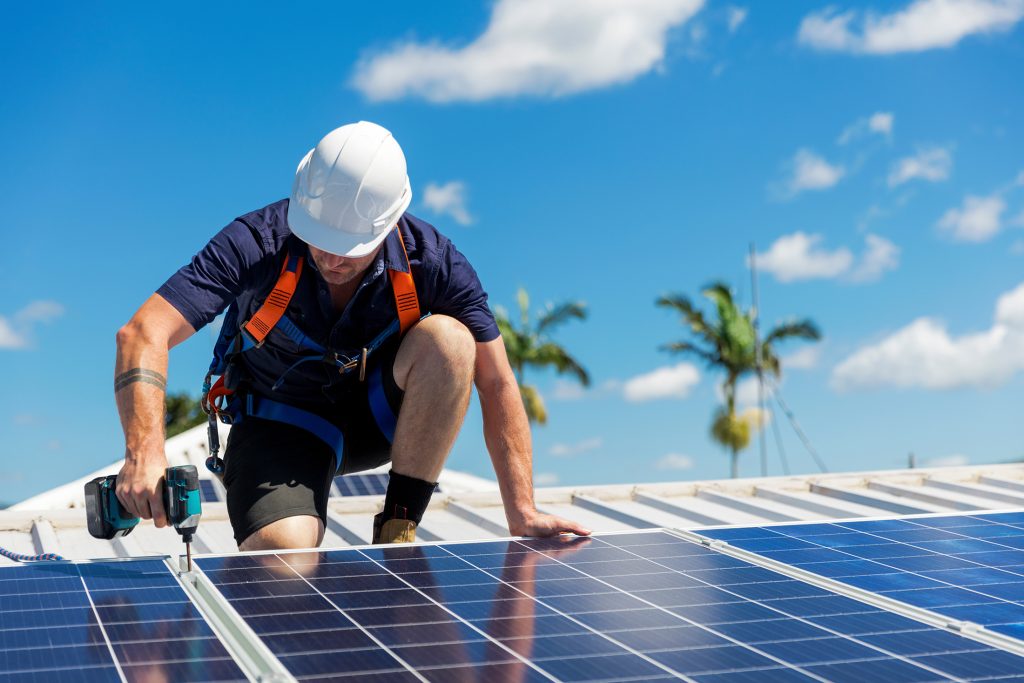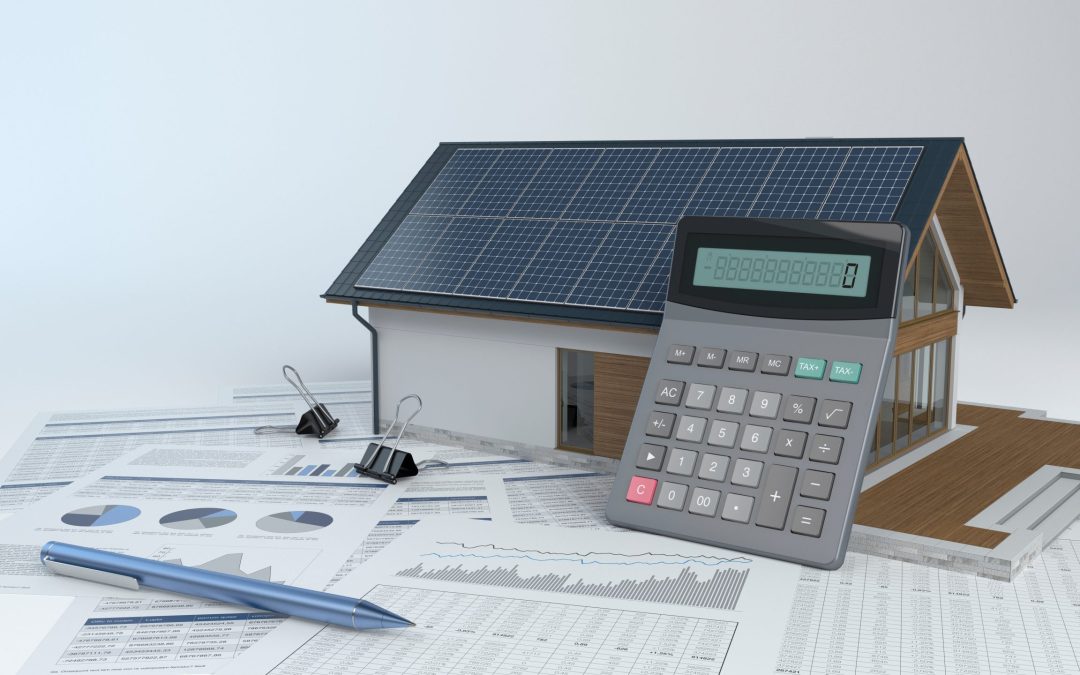The truth is that there are way many more than 3 reasons why you should get solar panels. Here are 10 Reasons to Get Solar for your home:
- Savings on Energy Bills: Florida is known as the “Sunshine State” because it has one of the highest levels of sunlight exposure in the United States. This allows solar panels to generate a significant amount of power, potentially lowering your electricity bill considerably.
- Tax Credits and Incentives: At the federal level, there is the Investment Tax Credit (ITC), allows homeowners to deduct 30% to 40% (40% for American made panels) of the cost of installing a solar energy system from their federal taxes. There might also be local and state incentives in Florida, making solar panels even more affordable.
- Increasing Property Value: Numerous studies have shown that homes with solar energy systems have higher property values and sell more quickly than non-solar homes. This can be a significant advantage when it’s time to sell your house.
- Energy Independence: With a GENERATOR OR BATTERY BACKUP, generating your own power can reduce your dependence on the grid and utility companies. This can be especially important during power outages or emergencies.
- Reducing Carbon Footprint: Solar panels generate electricity without producing greenhouse gas emissions. By installing solar panels, you can significantly reduce your home’s carbon footprint and contribute to efforts against climate change.
- Abundant Sunlight: Florida receives an average of 5 hours of full sunlight per day, even in the winter. This makes it one of the best states for solar energy production.
- Longevity and Durability: Solar panels are designed to withstand the elements, including the frequent storms that can occur in Florida. Most solar panels, inverters, and major components are warrantied to last 25 years but can often continue generating power beyond this.
- Net Metering Programs: Most Florida utilities offer net metering, which allows homeowners to sell excess solar power back to the grid. This can offset the cost of power drawn from the grid during nighttime or cloudy days.
- Efficiency in High Temperatures: Unlike some other electronic devices, solar panels lose very little efficiency in high temperatures. This makes them particularly suitable for Florida’s warm climate.
- Solar Battery Storage: With the addition of a solar battery, homeowners can store excess solar energy produced during the day to use at night or during power outages. This can be especially helpful in Florida where hurricanes can lead to prolonged outages.
Do you own rental properties or commercial buildings?
10 Reasons Floridians should get Solar Panels on Commercial Buildings

- Lower Operating Costs: Installing solar panels can substantially lower energy bills, reducing the operating costs of a rental or commercial property. These savings can then be passed on to tenants or reinvested into the property.
- Increased Property Value: Just as with residential properties, commercial buildings with solar installations tend to have higher property values. They’re attractive to potential buyers and tenants who understand the value of renewable energy.
- Fixed Energy Costs: Solar panels allow property owners to fix their energy costs for years into the future, as they will be less subject to fluctuations in energy prices.
- Tax Incentives and Depreciation: Businesses can benefit from tax incentives such as the federal Investment Tax Credit (ITC) and may also be able to depreciate the solar system over a period of time, providing significant tax benefits.
- Sustainable Branding: Businesses that show a commitment to sustainability often win customer loyalty. Installing solar panels can be a great way to showcase environmental stewardship and attract tenants or customers who value sustainability.
- Potential for Additional Income: Depending on the utility company’s policies, property owners may be able to sell excess power back to the grid, generating additional income.
- Long-term Energy Independence: Having solar panels can reduce a commercial building’s dependence on the grid and protect against future energy price increases.
- Reliability and Low Maintenance: Solar panels are durable, reliable, and require very little maintenance. This makes them ideal for installation on commercial buildings and rental properties where minimizing operational issues is key.
- Beneficial for Leases: If utilities are included in the lease agreement, the property owner can save on utility costs. If the tenant pays utilities, lower energy costs can make the property more attractive.
- Support Local Economy: Investing in solar energy not only promotes sustainability but also supports local jobs in the solar industry. It’s a way of contributing to the local economy while also benefiting from solar energy.
Need more reasons to get solar?
Local, State & Federal Tax Benefits for Solar
Here are some of the incentives that Floridians can benefit from when they install solar on their residential or commercial properties. Please verify with up-to-date sources or a tax professional as policies may have changed.
- Federal Investment Tax Credit (ITC): This credit applies to both residential and commercial solar installations. The Federal Investment Tax Credit (ITC) is a federal tax incentive for installing solar panels on your home or business, which reduces the cost of solar installation and will shorten the amount of time it takes to pay back your investment in solar energy12. Homeowners who leverage the 30%-40% ITC from the federal government can plan to see the following expenditures covered:
- Cost of solar panels
- Labor costs for installation, including permitting fees, inspection costs, and developer fees
- Any and all additional solar equipment, like inverters, wiring, and mounting hardware
- Energy storage systems rated three kilowatt-hours (kWh) or greater (starting in 2023).
- No sales tax or property taxes on solar expenses
- CLARIFICATION: The ITC gives back 30% of what you paid for your solar project (40% for American-made panels) on your federal income taxes. Instead of a deduction, which reduces your taxable income (as would happen with any charitable donations you make in a year), a tax credit directly offsets what you would otherwise owe in taxes. In other words, instead of just being taxed on a lower income, the federal ITC offsets what you actually owe in taxes, and can even come back to you as a refund from the IRS if you’ve overpaid your taxes during the year (but it won’t exceed your tax liability).
- MACRS Depreciation: Commercial solar energy systems are eligible for the Modified Accelerated Cost Recovery System (MACRS), which allows businesses to recover investments in certain properties through depreciation deductions. The Bipartisan Budget Act of 2018 reinstated the 100% bonus depreciation through 2022, with qualifying properties getting only an 80% bonus deduction in 2023, which means businesses can deduct the entire cost of their solar energy system in the year it’s installed.
- Sales Tax Exemption: In Florida, solar energy systems are exempt from the state’s sales and use tax. This means you won’t pay any additional costs on the purchase of the system.
- Property Tax Exclusion: Florida also offers a property tax exclusion for residential solar energy systems. That means the added value to your home from installing solar panels won’t increase your property taxes.
- Net Metering: While not a tax benefit, Florida’s net metering policies allow solar system owners to receive credit for excess solar electricity that they feed back into the grid. These credits can be used to offset the cost of electricity pulled from the grid when the system isn’t producing enough power, such as at night.
Remember that the specific benefits and how you can claim them can vary, so you should consult with a tax professional or a solar installation company to understand exactly what benefits are available to you.
What’s New for 2023?
Section 179 deduction dollar limits: For tax years beginning in 2023, the maximum section 179 expense deduction is $1,160,000. This limit is reduced by the amount by which the cost of section 179 property placed in service during the tax year exceeds $2,890,000.Also, the maximum section 179 expense deduction for sport utility vehicles placed in service in tax years beginning in 2023 is $28,900.
Phase down of special depreciation allowance: The special depreciation allowance is 80% for certain qualified property acquired after September 27, 2017, and placed in service after December 31, 2022, and before January 1, 2024 (other than certain property with a long production period and certain aircraft). The special depreciation allowance is also 80% for certain specified plants bearing fruits and nuts planted or grafted after December 31, 2022, and before January 1, 2024. See Certain Qualified Property Acquired After September 27, 2017 and What Is Qualified Property, later.

